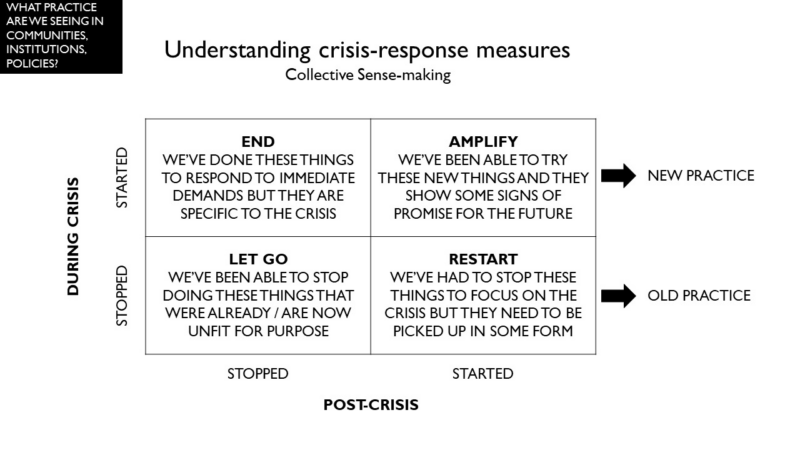There’s a lot of information and learning that is being shared – so let us try and give you an easy-to-digest summary. Our weeknotes are based on what we’re hearing from improvers across the UK and Ireland, members and partners as well as colleagues at the Health Foundation.
We try and do these weekly and keep them relatively short. Let us know if you find them helpful, or have suggestions for improvements.
What’s going on in improvement?
This week we announced the first in a series of virtual learning workshops. The workshops aim to support people to capture, review and learn from the rapid innovation and change that is taking place at the moment, and connect people across the UK and Ireland. Within 24 hours we reached our maximum number of 300 attendees. We were a little taken aback by this take-up and are busy making sure the agenda scales well for this number!
But perhaps we shouldn’t have been surprised at all. All around us we are seeing and hearing from people who, while deep in the challenges of service change and unrelenting pressure, see the opportunities emerging and understand how important it is to capitalise on them.
Our second weeknote shares lots of examples of how people are adapting to the crisis and the learning that is being generated.
Rapid learning and improvement
There has been so much sharing on Twitter this week: not just suggestions for how to share and learn quickly, but sharing practical ideas, tips and approaches that are being implemented. It’s great to see improvers across the UK and Ireland make the time to do this.
Graham Mackenzie wrote this interesting piece on the approaches and frameworks for capturing the new innovations that have emerged from COVID-19.
“When we look back at this period at the end of the COVID-19 pandemic, we may have a number of responses to different innovations. Some measures will be viewed as specific to the pandemic, and discontinued. Others will have become integral to our work, and adopted without a second thought.”
This sparked some chatter on the Twittersphere, with Amar Shah from East London Foundation Trust sharing their approach: a two-step process including a quality impact assessment followed by a redesign process involving both staff and service users.
AHSNs are also playing a key role in supporting people and organisations to share insight and best practice. UCLP for example, have set up this intensive care learning platform to rapidly gather and synthesise insights.
Of course not every form of sharing needs a high tech platform. Q member Suzette Woodward recommended two daily ‘take fives’ in her blog, where you involve everyone in five minutes of reflection. And we heard from Nathalie Delaney at the West of England AHSN where they’ve started a simple, weekly learning log. We’ll share more on these tools next week.
Virtual consultations
GP Rebecca Rosen shared her honest thoughts in virtual consultations on Twitter this week as a new digital GP. Do these resonate with you?
Related to virtual consultations is this digital exclusion map released by Citizens Online. The tool maps GP surgeries in England with a) higher numbers of people aged 65 and older on their registers and b) GP surgeries with the lowest levels of digital engagement. Citizens Online say that ‘organisations can use this information to help identify areas where there are more people who don’t tend to use digital tools, or who are not online at all.’ – potentially valuable insight for those implementing virtual services right now.
Staff health and wellbeing
600+ people tuned-in to this week’s NHS Horizon’s webinar on how we can better support BAME colleagues now and beyond COVID-19. The recording is now available to watch. Next week’s webinar on the wellbeing of newly remote workforces also looks interesting.
Q member Paul Hutton was featured in the HSJ this week about his project ‘Crowdcat’ – using data to track and inform decisions to improve mental health.
Finally, NHS People launch their virtual common room this week: a safe space to access to support and have discussions.
We are launching our common rooms this week. A great space to access support, enjoy a safe and confidential discussion and are hosted by experienced group leaders. Register at https://t.co/TDg3OKYdJy pic.twitter.com/W0gottjSVt
— We are NHS People (@people_nhs) April 29, 2020
Leadership and looking ahead
There were a couple of interesting pieces on leadership this week that are worth sharing and reading: the first from the RSA – ‘The path from Crisis’ on how COVID-19 is changing leadership. The accompanying diagram is also interesting:

And secondly this piece from Suzie Bailey and Michael West at the Kings Fund, on compassionate leadership in a crisis.
“They [NHS staff] have great wisdom, experience and profound values of compassion. They can all be leaders if the right conditions exist for them to be able to do what they know to be the right thing. Unleashing their collective wisdom requires compassionate leadership.”
Indeed.
Today NHS Confed have launched a new campaign – #NHSReset – to re-envisage the future of health and care post COVID-19. It’ll be interesting to see how this grows over the coming weeks and months.